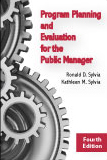
246 pages, $43.95 list
1-57766-778-6
978-1-57766-778-0
© 2012
paperback
Instructor's Manual available
eBook availability
Similar Titles
Program Planning and Evaluation for the Public Manager
Fourth Edition
In an era of rapidly shrinking resources, efficient utilization of public resources is of paramount importance. Health care, social services, education, law enforcement, and other fields have established their own standards against which program operations are assessed. National accrediting bodies have implemented systems of rigorous peer review to ensure the quality of program processes and outcomes. Nongovernmental organizations must demonstrate success in achieving their stated goals in order to sustain or expand program funding. In the 21st century, process (how programs are organized and how work is conducted) has become as important as outcomes in determining program effectiveness.
Responding to these dynamic challenges, the authors utilize concrete case studies to immerse students in the techniques of program evaluation. They effectively examine systems theory, project planning, queuing theory, cost-benefit analysis, and organization processes (including standards-based program accreditation), providing practical examples in an easy-to-comprehend style. In addition, comprehensive discussions explain how process intervention is utilized to achieve program adaptations and strategic change. Like its highly regarded predecessors, the latest edition features evaluation exercises designed to facilitate student development of indicators and measures when dealing with real-world programs. An Instructor’s Manual provides solutions to the case studies in the appendix of the text, further clarifying the program planning and evaluation process.
Responding to these dynamic challenges, the authors utilize concrete case studies to immerse students in the techniques of program evaluation. They effectively examine systems theory, project planning, queuing theory, cost-benefit analysis, and organization processes (including standards-based program accreditation), providing practical examples in an easy-to-comprehend style. In addition, comprehensive discussions explain how process intervention is utilized to achieve program adaptations and strategic change. Like its highly regarded predecessors, the latest edition features evaluation exercises designed to facilitate student development of indicators and measures when dealing with real-world programs. An Instructor’s Manual provides solutions to the case studies in the appendix of the text, further clarifying the program planning and evaluation process.
Reactions
“This is a practical and useful guide for beginners as well as seasoned leaders. It is especially germane for students of policy and administration because it provides real-world cases that immerse students in the techniques of program evaluation.” — Juniper Katz, University of Massachusetts, Amherst
Part I: FRAMEWORKS FOR ORGANIZATION ANALYSIS
1. Systems Concepts
The Systems Model / Holism / Systems Environments / Inside the System / Applying Systems Theory / Applying Systems to Management: A Checklist
2. Planning: The Often-Ignored Function
Recognizing the Need to Plan / Defining the Mission / Needs Assessment / Forecasting the Future / Determining Program Goals / Implementing the Plan / The Planning Hierarchy
3. Getting the Program Authorized and Funded
Using PERT/CPM for Program Planning / A PERT Application: The Case of New Town / Using Project Calendars / "Find a Need and Fill It." An NGO Example / Queuing Theory
Part II: PROCESS EVALUATION: The "Other" Approach
4. Standards-Based Evaluation: Matching Operations to Expectations
Standards-Based Organizational Assessment / Program Accreditation / Agency Accreditation / Importance of the Accreditation Process / Managerial Audits
5. Monitoring and Improving Internal Processes
Process Intervention/Evaluation / Summary of Process Evaluation
Part III: MEASURING ORGANIZATION OUTCOMES
6. Conducting an Outcome Evaluation
Preplanning the Evaluation / Defining Program Goals / A Model for Outcome Evaluation / Applying the Model to a Community Health Program
7. Research Validity and Evaluation Designs
Validity / Threats to Validity / Four Threats to External Validity / Design Selection
8. Cost-Benefit Analysis
Cost-Benefit Analysis and Rational Planning / The Techniques of Cost-Benefit Analysis / Advantages and Disadvantages of Cost-Benefit Analysis
9. A Ten-Point Checklist for Program Evaluators
Appendix: Case Studies
1. Systems Concepts
The Systems Model / Holism / Systems Environments / Inside the System / Applying Systems Theory / Applying Systems to Management: A Checklist
2. Planning: The Often-Ignored Function
Recognizing the Need to Plan / Defining the Mission / Needs Assessment / Forecasting the Future / Determining Program Goals / Implementing the Plan / The Planning Hierarchy
3. Getting the Program Authorized and Funded
Using PERT/CPM for Program Planning / A PERT Application: The Case of New Town / Using Project Calendars / "Find a Need and Fill It." An NGO Example / Queuing Theory
Part II: PROCESS EVALUATION: The "Other" Approach
4. Standards-Based Evaluation: Matching Operations to Expectations
Standards-Based Organizational Assessment / Program Accreditation / Agency Accreditation / Importance of the Accreditation Process / Managerial Audits
5. Monitoring and Improving Internal Processes
Process Intervention/Evaluation / Summary of Process Evaluation
Part III: MEASURING ORGANIZATION OUTCOMES
6. Conducting an Outcome Evaluation
Preplanning the Evaluation / Defining Program Goals / A Model for Outcome Evaluation / Applying the Model to a Community Health Program
7. Research Validity and Evaluation Designs
Validity / Threats to Validity / Four Threats to External Validity / Design Selection
8. Cost-Benefit Analysis
Cost-Benefit Analysis and Rational Planning / The Techniques of Cost-Benefit Analysis / Advantages and Disadvantages of Cost-Benefit Analysis
9. A Ten-Point Checklist for Program Evaluators
Appendix: Case Studies